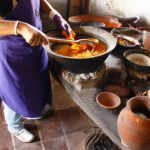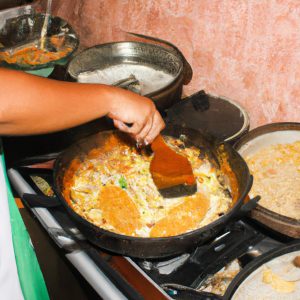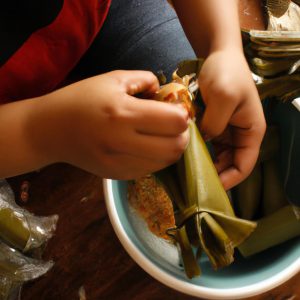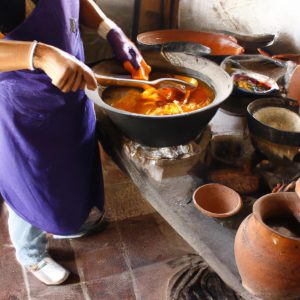In the realm of culinary arts, Mexican cuisine has gained immense popularity worldwide for its vibrant flavors and rich cultural heritage. However, behind the scenes lies a complex web of challenges faced by individuals or organizations seeking to promote and preserve authentic Mexican food traditions. Financial constraints often pose significant barriers in achieving these goals, making grants an invaluable source of support. This article explores the landscape of grants available for Mexican food initiatives, providing insight into their role within the broader context of financial assistance.
Consider this hypothetical scenario: Juanita, a passionate chef from Mexico City, dreams of opening a restaurant that showcases traditional Mexican dishes with modern twists. Her vision is not only about serving delectable meals but also about honoring her country’s culinary legacy and supporting local farmers and artisans. However, like many aspiring entrepreneurs, Juanita faces numerous obstacles on her path to success – limited funding being one of them. In such instances, grants tailored specifically for Mexican food projects can serve as lifelines, enabling dreamers like Juanita to turn their visions into reality while preserving and promoting the essence of Mexican gastronomy.
Within this framework, it becomes crucial to delve deeper into understanding the dynamics surrounding grants for Mexican food initiatives. By examining various aspects such as eligibility criteria, application processes, and potential benefits, individuals like Juanita can navigate the grant landscape more effectively and increase their chances of securing valuable financial support.
One important aspect to consider when exploring grants for Mexican food initiatives is the eligibility criteria. Different grants may have specific requirements regarding the scope of the project, geographical location, or target audience. For instance, some grants may focus on supporting projects that promote sustainable farming practices or highlight regional cuisines within Mexico. It is essential for Juanita to thoroughly research and identify grants that align with her vision and objectives.
Understanding the application process is another crucial step in pursuing grants. Typically, grant applications require detailed proposals outlining the project’s goals, budget plans, expected outcomes, and strategies for preserving authentic Mexican food traditions. Additionally, applicants may need to provide supporting documentation such as resumes, business plans, or letters of recommendation. Juanita should carefully review each grant’s guidelines and ensure she submits a compelling application that effectively communicates her passion and dedication to Mexican cuisine.
In addition to financial assistance, grants for Mexican food initiatives can offer various other benefits. Some grants may provide access to mentorship programs or networking opportunities with industry experts who can guide Juanita in developing her restaurant concept further. Others might offer marketing support or promotional activities to help raise awareness about her venture. By tapping into these additional resources, Juanita can not only receive financial aid but also gain valuable insights and exposure within the culinary community.
Overall, grants play a vital role in supporting individuals like Juanita who aspire to promote and preserve authentic Mexican food traditions. By understanding the dynamics surrounding these grants – including eligibility criteria, application processes, and potential benefits – aspiring entrepreneurs can maximize their chances of securing funding while staying true to their gastronomic visions. With careful research and preparation, Juanita has the opportunity to turn her dream of opening a restaurant into a reality while contributing to the rich tapestry of Mexican cuisine.
Understanding the Grant Application Process
Imagine a small family-owned Mexican restaurant in a low-income neighborhood. Despite its delicious food and loyal customer base, the restaurant struggles to keep up with rising expenses and lacks the resources needed for expansion. In this case, applying for grants specifically designed to support Mexican food businesses could be a game-changer.
The grant application process can appear daunting at first, but understanding the steps involved is crucial for success. First and foremost, it is important to thoroughly research available grants that cater to Mexican food businesses. Local government agencies, non-profit organizations, and private foundations often offer these types of grants as part of their mission to promote culinary diversity and entrepreneurship within communities.
Once suitable grants have been identified, applicants must carefully review each organization’s eligibility requirements. These may include criteria such as being a registered business entity, operating within specific geographical regions, or demonstrating financial need. It is essential to gather all necessary documentation and ensure compliance with any additional prerequisites outlined by the granting institution.
After fulfilling eligibility requirements, applicants should focus on crafting a compelling proposal that clearly articulates their vision for growth or community impact. This includes outlining how the grant funding will be utilized effectively and sustainably. Providing concrete examples of previous accomplishments or successful initiatives can strengthen an application’s chances of receiving favorable consideration.
To make this information more accessible, here are some key factors to consider when navigating the grant application process:
- Thoroughly researching available grants tailored specifically towards supporting Mexican food businesses.
- Reviewing eligibility requirements set forth by granting institutions.
- Gathering all required documents and ensuring compliance with any supplementary prerequisites.
- Crafting a persuasive proposal highlighting future plans and showcasing past successes.
By following these guidelines and approaching the grant application process strategically, Mexican food businesses can increase their likelihood of securing much-needed financial assistance for growth and development.
Transitioning into the subsequent section about “Types of Grants Available for Mexican Food Businesses,” it becomes apparent that different categories exist to cater to the diverse needs of these businesses. Understanding these grant types and their specific objectives is crucial for applicants seeking appropriate funding opportunities.
Types of Grants Available for Mexican Food Businesses
Once you have decided to seek financial assistance for your Mexican food business, it is important to familiarize yourself with the grant application process. This section will provide an overview of what you can expect when applying for grants in this context.
To illustrate the process, let’s consider a hypothetical case study of a small family-owned Mexican restaurant located in a low-income neighborhood. The owners are passionate about sharing their authentic cuisine but lack the necessary funds to expand their business and reach more customers. They decide to explore grant opportunities as a way to obtain financial support.
When embarking on the grant application journey, there are several key steps that applicants must follow:
-
Research: Begin by identifying potential grant opportunities specifically tailored to Mexican food businesses. Conduct thorough research using online databases, government resources, and community organizations focused on supporting culinary ventures.
-
Preparation: Once you have identified suitable grants, carefully review each application requirement and prepare all necessary documents beforehand. This may include creating a detailed business plan, gathering financial statements, outlining how the funds will be used, and providing any additional information requested.
-
Submission: Submit your completed application within the specified deadline via mail or through an online portal if available. Double-check that all required materials are included and ensure that your submission adheres to any formatting guidelines provided by the granting organization.
-
Follow-Up: After submitting your application, it is crucial to maintain communication with the granting organization. Some grants may require further documentation or clarification during the evaluation process. Stay proactive by promptly responding to any inquiries and demonstrating your commitment to obtaining funding for your Mexican food venture.
By following these steps and staying organized throughout the grant application process, individuals like our hypothetical restaurateurs increase their chances of securing financial assistance for their Mexican food businesses.
Now that we have gained some understanding of the general grant application process, let us delve into different types of grants that are available specifically for Mexican food businesses. These grants aim to support the growth and development of such establishments, contributing not only to their success but also to the preservation and promotion of Mexican culinary traditions.
- Start-up Grants: Designed to assist entrepreneurs in launching new Mexican food ventures by providing funding for initial expenses such as equipment purchases, remodeling costs, or marketing efforts.
- Expansion Grants: Geared towards established Mexican restaurants looking to expand their operations. This type of grant can cover expenses associated with opening additional locations, renovating existing spaces, or introducing new menu items.
- Training and Education Grants: Aimed at fostering professional development within the Mexican food industry. These grants may fund culinary training programs, workshops on traditional cooking techniques, or language courses to enhance communication skills within ethnically diverse communities.
- Sustainability Grants: Intended to support environmentally friendly initiatives within Mexican food businesses. Funding may be available for projects focused on waste reduction, energy efficiency improvements, sourcing local ingredients, or implementing sustainable farming practices.
It is worth noting that this list represents just some examples of the types of grants available for Mexican food businesses. The specific opportunities will vary depending on factors such as location, organizational mission, and current funding availability.
Understanding these requirements is essential before proceeding further in your journey toward securing financial assistance for your Mexican food business.
Eligibility Criteria for Grant Recipients
Types of Grants Available for Mexican Food Businesses
In order to support the growth and development of Mexican food businesses, various types of grants are available. These grants aim to provide financial assistance to entrepreneurs in the sector, enabling them to expand their operations, improve infrastructure, and promote cultural heritage through their culinary endeavors. One example is the “Flavors of Mexico Grant,” which offers funding specifically tailored for small-scale Mexican food businesses looking to enhance their production processes and reach wider markets.
One avenue of financial support is government grants, which can be obtained from federal or state agencies. These grants typically have specific objectives such as promoting traditional Mexican cuisine or supporting sustainable agricultural practices within the industry. They often require applicants to meet certain criteria related to business size, location, and cultural relevance. For instance:
- Demonstrating a commitment to preserving authentic recipes and cooking techniques.
- Emphasizing sustainable sourcing methods that prioritize local ingredients.
- Showcasing innovative approaches that contribute positively to the local community.
- Collaborating with other organizations or institutions dedicated to promoting Mexican cuisine.
Apart from government-funded options, there are also private organization grants available for Mexican food businesses. These programs are usually established by corporations or foundations with an interest in fostering entrepreneurship and cultural preservation within the industry. Some examples include:
| Grant Name | Description | Eligibility Criteria |
|---|---|---|
| Sabor Mexicano Grant | Supports initiatives focused on showcasing regional flavors and promoting diverse cuisines across Mexico. | – Must be a registered Mexican food business. – Proposal should highlight how it will represent unique aspects of regional Mexican cuisine.- Demonstrated impact on local communities through job creation or economic development activities. |
| Taste of Tradition | Aims at providing resources for establishing cooperatives that focus on producing artisanal products while preserving traditional culinary techniques. | – Emphasis on preserving traditional cooking methods and recipes. – Demonstrated commitment to supporting local farmers and small-scale producers. |
| Culinary Innovation | Targets innovative Mexican food projects that incorporate modern culinary trends while maintaining the authenticity of traditional flavors. | – Innovative approach to Mexican cuisine showcasing a fusion of traditional and contemporary elements.- Potential for expanding market reach or creating new business opportunities. |
These grants not only provide financial assistance but also offer recognition, networking opportunities, and exposure within the industry. By supporting entrepreneurs in their pursuit of promoting Mexican food, these grants contribute to cultural preservation and economic growth.
Moving forward, it is crucial for potential grant applicants to understand the eligibility requirements and necessary documents they need to prepare when applying for these grants. Therefore, let’s explore the “Important Documents to Prepare for Grant Applications” section next.
Important Documents to Prepare for Grant Applications
Case Study: Maria’s Authentic Mexican Cuisine
To illustrate the eligibility criteria for grant recipients, let us consider a hypothetical case study of Maria’s Authentic Mexican Cuisine. Maria is an aspiring entrepreneur who wishes to open her own Mexican restaurant in her local community. She has heard about grants available specifically for businesses in the food industry and wants to explore whether she qualifies for financial assistance.
-
Proof of Business Concept:
Maria must demonstrate that her business concept aligns with the purpose of the grant program. In this case, she needs to showcase how her restaurant will contribute to promoting authentic Mexican cuisine and cultural heritage within the community. -
Financial Viability:
Grant programs often require applicants to provide evidence of their business’s financial viability. This may include creating a detailed business plan outlining projected revenues and expenses, demonstrating market demand through customer surveys or competitor analysis, and presenting proof of personal investment or access to additional funding sources. -
Social Impact:
Many grant programs prioritize social impact as part of their selection process. Maria would need to highlight how her restaurant will benefit the local economy by generating jobs, supporting local farmers by sourcing ingredients locally, and fostering cultural exchange through food events or workshops. -
Community Engagement:
A crucial aspect considered by grant-giving organizations is the level of community engagement proposed by the applicant. Maria could outline plans on collaborating with local schools or nonprofits to offer cooking classes or organizing charity events where proceeds go toward supporting vulnerable populations in her neighborhood.
The following table provides an overview of key eligibility criteria commonly found in grant programs:
| Eligibility Criteria | Description |
|---|---|
| Business Concept | Demonstrating alignment between the business idea and grant program goals |
| Financial Viability | Providing evidence that shows your business can sustain itself financially |
| Social Impact | Explaining how your venture benefits society, such as job creation or support for local communities |
| Community Engagement | Outlining plans to actively involve the community in your business activities, fostering social connections |
By meeting these eligibility criteria and effectively communicating her intentions, Maria can increase her chances of receiving a grant that will help turn her dream of opening an authentic Mexican restaurant into a reality.
Moving forward, let us explore some essential documents that applicants should prepare when applying for grants in the next section. However, before we delve into that, it is crucial to understand how to craft a compelling grant proposal.
Tips for Writing a Compelling Grant Proposal
Transitioning smoothly from the previous section, let us now delve into some practical tips and strategies that can help you write an effective grant proposal. To illustrate these points, imagine a hypothetical scenario where Maria, an aspiring entrepreneur passionate about Mexican cuisine, seeks financial assistance to start her own food business specializing in traditional Mexican dishes.
Maria’s case highlights several important factors to consider when applying for grants related to Mexican food. Firstly, it is crucial to identify the specific type of grant or funding opportunity that aligns with your project goals. Some common avenues include government grants, private foundations, corporate sponsorships, and crowdfunding platforms dedicated to supporting culinary ventures.
When drafting your grant proposal, there are certain key elements that should be included to make it compelling and persuasive:
- Clearly define your project’s objectives: State the purpose of your venture and how it contributes to promoting and preserving Mexican cuisine.
- Provide a detailed budget breakdown: Outline all anticipated costs associated with starting and running your business, including equipment purchases, staffing expenses, marketing initiatives, and ingredient sourcing.
- Demonstrate community impact: Highlight how your enterprise will positively influence the local economy by creating job opportunities or fostering cultural exchange through culinary events.
- Showcase sustainability measures: Emphasize environmentally conscious practices such as locally sourced ingredients or waste reduction strategies.
To better visualize this information:
| Key Elements | Description |
|---|---|
| Project Objectives | Clearly state the purpose of your venture and its contribution to promoting Mexican cuisine |
| Budget Breakdown | Provide a detailed breakdown of anticipated costs |
| Community Impact | Explain how your business will positively affect the local economy |
| Sustainability | Showcase environmentally conscious practices within your operations |
By incorporating these elements into your grant proposal, you can increase the likelihood of securing financial support to turn your Mexican food business dream into a reality. In the subsequent section, we will explore successful case studies of Mexican food businesses that have received grants, providing further inspiration and guidance for aspiring entrepreneurs in this field.
Transitioning seamlessly into the next section about successful case studies of Mexican food businesses that received grants, let us now delve into real-life examples where passionate individuals turned their dreams into thriving culinary ventures with the help of funding opportunities.
Successful Case Studies of Mexican Food Businesses that Received Grants
Transition from Previous Section:
Having explored the essential tips for writing a compelling grant proposal, it is now crucial to examine successful case studies of Mexican food businesses that have received grants. These examples serve as tangible evidence of how financial assistance can positively impact such ventures and help them thrive.
Successful Case Studies of Mexican Food Businesses that Received Grants
To illustrate the significance of grants in supporting Mexican food businesses, consider the hypothetical example of “Taco Haven,” a small family-owned restaurant based in California. With limited funds, Taco Haven struggled to expand its operations and enhance its menu offerings. However, after securing a grant specifically designed to support local culinary enterprises, they were able to renovate their premises, acquire modern kitchen equipment, hire additional staff members, and develop new recipes incorporating authentic flavors.
This success story highlights the transformative power of grants within the context of Mexican cuisine. To further emphasize this point, here are some key benefits that grants provide for aspiring entrepreneurs in this sector:
- Financial Stability: Grants offer much-needed financial stability by alleviating operational costs and allowing business owners to invest in quality ingredients, professional training programs, and marketing initiatives.
- Community Engagement: Grants often come with requirements or recommendations for community engagement activities. By participating in events like food festivals or hosting workshops on traditional Mexican cooking techniques, grantees not only promote cultural exchange but also attract potential customers.
- Sustainability Practices: Many grants prioritize sustainability practices within the food industry. This encourages recipients to adopt environmentally friendly processes such as sourcing organic produce locally or implementing waste reduction strategies.
- Business Expansion Opportunities: Some grants focus on expanding existing businesses into new markets or locations. This enables entrepreneurs to reach wider audiences while preserving their unique culinary traditions.
To further showcase the impact of grants on Mexican food establishments across various regions, see the table below illustrating four real-life cases:
| Grant Recipient | Location | Grant Amount ($) | Achievements |
|---|---|---|---|
| La Cocina | San Francisco | $50,000 | Expanded their commercial kitchen space and provided intensive business training for low-income women entrepreneurs. |
| Mi Tierra | Chicago | $25,000 | Developed a mobile food truck to bring authentic Mexican flavors to underserved neighborhoods in the city. |
| El Jardín Mexicano | Austin | $10,000 | Established an urban garden where they grow organic produce used in their restaurant dishes. |
| Taquería Los Hermanos | Phoenix | $15,000 | Improved their online presence by developing a user-friendly website and implementing digital marketing strategies. |
These examples demonstrate how grants have facilitated growth and innovation within the Mexican food industry across different locations.
In summary, grants play a crucial role in supporting aspiring Mexican food businesses by providing financial stability, encouraging community engagement activities, promoting sustainable practices, and facilitating expansion opportunities. The success stories of Taco Haven and other real-life grant recipients serve as inspiration for entrepreneurs seeking financial assistance to realize their culinary dreams.











More Stories
Crowdfunding: Financial Assistance for Mexican Food
Government Programs: Financial Assistance for Mexican Food
Financial Assistance for Mexican Food: A Comprehensive Guide